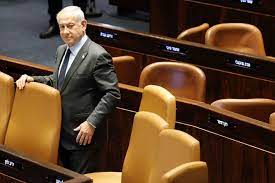Osama Al-Sharif
After more than 12 weeks of anti-government protests, culminating in Sunday night’s mass demonstrations following the sacking of Defense Minister Yoav Gallant, a beleaguered Israeli Prime Minister Benjamin Netanyahu finally caved in to pressure and announced on Monday evening that he was suspending the passing of a controversial law to limit the powers of the judiciary.
On Monday, as Israel went through a series of general strikes that paralyzed the country amid an unprecedented state of polarization, with signs that the country was inching toward violent confrontations between those who are against the judicial overhaul and those, on the far right, who support it, Netanyahu decided he had no more moves to make. In his evening speech, Netanyahu said he wanted to avert civil war and was keen on preserving unity. He added that he was ready for dialogue, which he had always supported. In fact, he had ignored numerous appeals by President Isaac Herzog to sit with the opposition and find a compromise. And when Herzog proposed his own compromise, Netanyahu and his extremist partners in the ruling coalition brushed it away.
But by prolonging the crisis, Netanyahu has painted himself into a corner. He now finds himself between a rock and a hard place. If he scraps the proposed reforms, his coalition government will surely collapse, throwing the country into a vortex and killing his political career. And if he pushes on in a few weeks’ time, the protests and the strikes, not to mention the serious divisions within the military establishment, will resurface. Now, in order to keep his shaky coalition united, he has struck a deal with ultranationalist Minister of National Security Itamar Ben-Gvir, who agreed to the suspension of the judicial overhaul plan in return for him being allowed to head his own armed militia outside the jurisdiction of the army and police.
In reality, Netanyahu has done more damage to Israel’s security and unity in the space of a few months than any external foe has ever done since the state was created. Netanyahu is an opportunist who is ready to do anything to protect himself from being removed from office as his corruption trial continues. He is also using the far right, a mixture of religious and ideological extremists, to deliver his objective of weakening – and in effect neutralizing – the Supreme Court in Israel. It is a symbiotic relationship, in which the far right is using Netanyahu’s judicial coup to change the character of the Israeli state. And this is what it boils down to in the end. The anti-government camp wants to defend the identity of the state as a secular and democratic entity, even if it is only for the benefit of its Jewish citizens. Supporters of the coalition government – what can only be described as a “dream team,” bringing together the far right, ultranationalists, settlers, Orthodox Jews and religious Zionists – have a wide and conflicting agenda, ranging from turning Israel into a religious autocracy, with Taliban-like beliefs, to extending Israeli rule over all of the West Bank and beyond.
Netanyahu was able to hammer together a coalition that few in Israel believed would last for long – but long enough to pass laws that would keep him from jail. It now appears that his gambit has failed. The reaction to his constitutional coup has been resounding, with leaders of allied countries and Jewish groups across the globe, including the US, united in rejecting it. It also pushed former army, police and intelligence officers, as well as politicians from all shades of the political spectrum, to issue a warning that Israel is heading toward dictatorship. The timing of this crisis is also crucial. The West Bank is on fire, with the Israeli army losing control of the security situation as settlers and Palestinian activists engage in retaliatory attacks. Tensions are also rife along the northern borders with Lebanon, while there are fears that Iran could be weeks away from building a nuclear weapon. The military establishment has warned that the Israeli army is witnessing deep divisions, with public calls for mutiny by thousands of reservists.
The opposition, which can claim victory over the coalition, will be emboldened by Netanyahu’s decision to back down – for now. But this is just one battle in a long war that is now raging between the secular-liberal camp and the extremists. Former Prime Minister Yair Lapid promised on Monday that he would push to adopt a written constitution for Israel; one that codifies the separation of powers and prevents a future constitutional coup. This war will rage on for years, with what some analysts have called the “soul of Israel” at stake. It is unfortunate that the fight for a democratic and secular Israel is not linked to ending the occupation. It should be. Israel cannot free itself from the tyranny of self-serving racist, ultranationalist and ultrareligious groups unless it finally delinks itself from the Palestinian people and allows them to live in freedom and security along its side.







